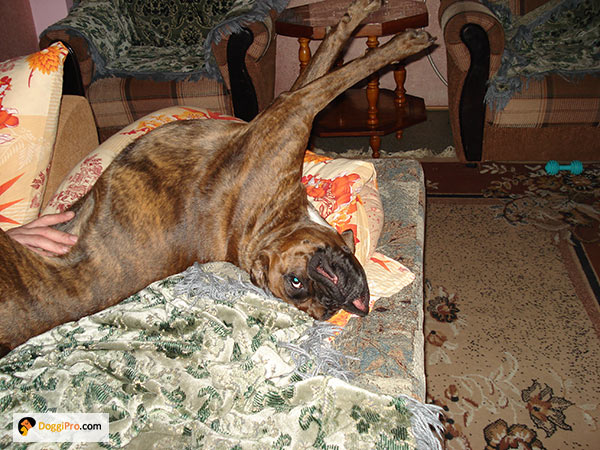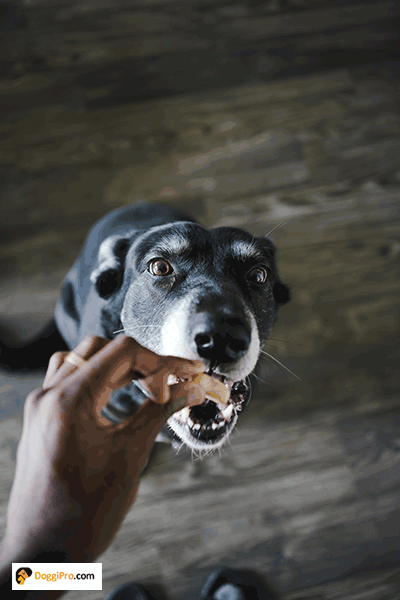The scene is all too familiar: you’re winding down for the night, ready to curl up in bed with a good book or drift off to sleep. But instead of peaceful quiet, your furry friend erupts in a frenzy of zoomies, tearing around the house with boundless energy.
You might find yourself asking, “Why does my dog get hyper before bed?” This phenomenon, often called puppy zoomies or dog zoomies, isn’t uncommon. In fact, many dog owners experience this burst of hyperactivity in their pets just when they’re craving peace and quiet.
But understanding the why behind this behavior is crucial to addressing it effectively and achieving a harmonious bedtime for you and your canine companion.
So, why is your puppy so hyper at night? Let’s explore the potential reasons and strategies for helping your furry friend settle down for a restful sleep.
Understanding Canine Hyperactivity
Ever witnessed your dog transform into a whirlwind of fur and paws just as bedtime approaches? You’re not alone. This nighttime burst of energy, aptly named puppy zoomies or dog zoomies, is a common phenomenon that leaves many owners wondering, “Why does my dog get hyper before bed?”. While these frenetic bursts might seem random, there’s often a logic behind them. Let’s dive into the reasons behind your dog’s pre-bedtime antics.
Frenetic Random Activity Period (FRAP)
Before we delve deeper, let’s meet the culprit behind the zoomies – FRAP. This biological term describes a natural occurrence in young dogs, characterized by sudden bursts of intense activity. Think of it as a built-in playtime switch that activates randomly, often in the late afternoon or evening. So, next time your dog embarks on a pre-bed zoomie spree, remember, it’s not personal; it’s biology!
Energy Levels Run High
But biology isn’t the only player. Excess energy plays a major role in nighttime hyperactivity. Suppose your dog needs more physical and mental stimulation throughout the day. In that case, that pent-up energy needs an outlet, and bedtime often becomes the unfortunate target. Think of it like a car with a full tank – if it isn’t driven, the energy has nowhere to go!
Excited Puppy, Restless Nights
Let’s not forget the excitement factor. For puppies, bedtime can be a confusing mix of emotions. They’re excited to snuggle with you but also wary of being separated from their source of play and exploration. This conflicting mix can manifest as hyperactivity, as they try to burn off that excitement before settling down. Additionally, some dog breeds are naturally more active and require more stimulation, making them prone to evening zoomies even as adults.
Understanding the root cause of your dog’s hyperactivity is key to finding a solution. Whether your dog is channeling FRAP energy, addressing pent-up energy through exercise, or calming their bedtime jitters, knowing the “why” will help you create a peaceful bedtime routine for you and your furry friend.
Contributing Factors – More Than Just Puppy Zoomies
While FRAP, energy levels, and excitement play a significant role in pre-bedtime hyperactivity, other factors can contribute to your dog’s restless evenings. Let’s explore additional reasons why your furry friend might act like a nighttime party animal.
Dog Anxious at Night
Ever noticed your dog pacing or whining as bedtime approaches? This could be a sign of anxiety or separation anxiety. Being left alone in the dark and quiet can be unsettling for some dogs, especially if they haven’t been properly trained or developed a strong bond with their owner. This anxiety can manifest as hyperactivity as they try to cope with their fear and discomfort.
Creating a Calming Haven
The environment where your dog sleeps also plays a crucial role. Just like humans, dogs thrive in comfortable and familiar spaces. A cluttered, noisy, or brightly lit bedroom can contribute to their pre-bedtime energy. A quiet, dark, cozy, dedicated sleeping area can signal your dog that it’s time to wind down.
Diet and Feeding Schedule
What goes on affects how they react. While it might seem obvious, your dog’s diet and feeding schedule can also impact its nighttime behavior. Feeding your dog a large meal or sugary treats close to bedtime can lead to a sugar rush and difficulty settling down. Sticking to a consistent feeding schedule and avoiding overly stimulating foods before bed can help regulate your dog’s energy levels and promote a calmer sleep.
Understanding the specific triggers for your dog’s hyperactivity is essential for effectively addressing the issue. Consider observing your dog’s behavior and environment to identify potential anxiety stressors, create a soothing sleeping space, and adjust their diet and feeding schedule if needed. Addressing these contributing factors can create a more peaceful bedtime routine for you and your furry friend.

Strategies for Calming Your Dog – From Zoomies to Sweet Dreams
Now that we understand the reasons behind your dog’s pre-bedtime hyperactivity, it’s time to explore strategies for creating a peaceful end to the day. Remember, consistency is key – the more you stick to these calming techniques, the easier it will be for your dog to learn and settle into a relaxed routine.
Calming Techniques
Let’s start with some general tips to help calm your dog before bed. Consider incorporating soothing activities like gentle brushing, massage, or relaxing music. Offer chew toys or puzzle feeders to engage their minds and satisfy chewing needs without overstimulating them. Additionally, providing safe and quiet places to retreat, like a cozy crate or designated bed, can offer a sense of security and promote relaxation.
Bedtime Routine
Establishing a consistent bedtime routine is crucial. Set a specific time for lights out and stick to it as much as possible. Include calming activities like short walks, playtime with quiet toys, and gentle petting. This routine helps signal your dog that it’s time to wind down and prepare for sleep.
Exercise is Key
Remember the power of exercise. A tired dog is a happy (and sleepy) dog! Ensure your dog gets enough physical and mental stimulation throughout the day through walks, playtime, training sessions, or interactive toys. This helps burn off excess energy and leaves them less likely to zoom around at night. Remember, tailor the exercise to your dog’s age, breed, and individual needs.
Managing Anxiety
If you suspect anxiety is a contributing factor, addressing the source of anxiety directly is crucial. Consider crate training, which can provide a secure and familiar space for dogs experiencing separation anxiety. Techniques like desensitization and counterconditioning can also help reduce anxiety over time. Sometimes, consulting a veterinarian or animal behaviorist for guidance might be beneficial.
By implementing these strategies and addressing the underlying reasons for your dog’s hyperactivity, you can create a calmer and more enjoyable bedtime experience for you and your furry friend. Remember, patience and consistency are key. Don’t hesitate to seek professional help. Sweet dreams await!
Implementing a Calming Routine – From Chaos to Quietude
Now that we have a toolbox full of calming strategies let’s put them into action by creating a calming bedtime routine for your furry friend. Consistency is key, so stick to this routine as much as possible to help your dog learn and anticipate what comes next.
Crate Training for Security and Calm
If your dog still needs to be crate-trained, consider exploring this option. Crates can provide a safe and secure den-like space that promotes calmness and reduces anxiety, especially for dogs prone to separation anxiety. Ensure the crate is the right size, comfortably furnished, and positioned in a quiet area of the house. Start introducing your dog to the crate gradually and positively, making it a place they associate with relaxation and positive experiences.
Evening Activities: Choose Wisely
Pre-bedtime activities are crucial in setting the stage for a peaceful night. Avoid overstimulating activities like rough play, tug-of-war, or intense training sessions close to bedtime. Opt for calming alternatives like gentle walks, snuffle mats, or interactive puzzles that engage their minds without hyping them up. Remember, a tired dog is a sleepy dog!
Soothing Sounds and Touches
Incorporate calming music into your routine. Classical music, nature sounds, or even white noise can create a relaxing atmosphere. Combine this with gentle petting and massage, focusing on calming areas like the head, chest, and ears. These soothing touches can further promote relaxation and help your dog wind down.
Remember, a consistent and calming bedtime routine goes a long way in establishing healthy sleep habits for your dog. By offering a safe space, avoiding overstimulation, and incorporating relaxing activities, you can create a peaceful transition from playtime to dreamland for you and your furry friend.
Bonus Tip: Consider using calming aids like pheromone diffusers or natural supplements (always consult your veterinarian before introducing new supplements). Combined with the strategies above, these tools can create an even more tranquil environment for your dog’s bedtime routine.
Dietary Considerations for Restful Nights
We’ve covered calming techniques and routines, but don’t underestimate the power of diet in regulating your dog’s nighttime energy levels. What and when your dog eats can significantly impact pre-bedtime behavior and sleep patterns.

Dog Food Matters
The type of food you feed your dog plays a role. Opt for high-quality dog food for your dog’s age, breed, and activity level. Avoid foods with high sugar content or artificial ingredients, as these can trigger energy spikes and difficulty settling down. Consider consulting your veterinarian or a canine nutritionist for personalized recommendations based on your dog’s needs.
Timing is Key
Just as important as what you feed is when you feed. Avoid giving your dog large meals or treats close to bedtime. This can lead to indigestion, discomfort, and an energy surge right when they should be winding down. Stick to a consistent feeding schedule, with their last meal several hours before bedtime. This allows for proper digestion and prevents late-night energy spikes that can disrupt sleep.
Puppy Feeding
For puppies, frequent small meals throughout the day are typically recommended. However, adjust their feeding schedule as they age, gradually transitioning to two meals daily, ensuring the last one isn’t too close to bedtime.
Remember, dietary considerations are just one piece of the puzzle. Combining these tips with the calming strategies and routines discussed earlier can create a holistic approach to managing your dog’s nighttime energy levels and promote peaceful sleep for everyone.
Bonus Tip: If you suspect your dog’s hyperactivity is linked to food sensitivities, consider consulting a veterinarian for allergy testing and dietary adjustments. Addressing any underlying dietary issues can significantly improve their sleep and overall well-being.
When to Seek Professional Help – Understanding “Normal” vs. Needing Assistance
While puppy zoomies and occasional bursts of pre-bedtime energy are relatively common, there are situations where seeking professional help might be necessary. It’s crucial to distinguish between “normal” dog behavior and potential underlying issues that require veterinary attention.
Normal Active Dog vs. Behavioral Issues
Remember, some dog breeds are naturally more energetic and require more stimulation than others. Suppose your dog exhibits bursts of energy but settles down readily with calming techniques and a consistent routine. In that case, it’s likely within normal behavior for their breed and age. However, if the hyperactivity is excessive, persistent, or accompanied by other concerning signs, it’s time to seek professional help.
Signs to Watch Out For
Be mindful of the following red flags that might indicate an underlying issue:
- Excessive vocalization (whining, barking) or destructive behavior during bedtime or throughout the day
- Inability to settle down or relax even after calming efforts
- Changes in sleep patterns or appetite
- Physical signs like pacing, panting or trembling
Consulting a Veterinarian or Animal Behaviorist
If you observe any of these signs or your gut instinct tells you something isn’t right, don’t hesitate to consult your veterinarian. They can rule out any potential medical conditions contributing to the hyperactivity. Additionally, consider seeking guidance from a certified animal behaviorist. They can offer specialized training and behavior modification techniques to address underlying anxieties, separation anxiety, or other factors contributing to the issue.
Early intervention is key. Addressing potential concerns promptly can improve your dog’s well-being, sleep quality, and overall behavior, creating a calmer and more harmonious environment for everyone in your home.
Bonus Tip: Don’t be afraid to seek professional help even if unsure. A consultation with a veterinarian or animal behaviorist can provide valuable insights and peace of mind, even if your dog’s hyperactivity falls within the range of normal behavior.
By understanding the difference between normal dog behavior and potential underlying issues and seeking professional help when needed, you can ensure your furry friend gets the support he or she needs for a calm and restful night’s sleep, leading to a happier and healthier life for both of you.

Conclusion: Sweet Dreams for You and Your Furry Friend
So, why does your dog get hyper before bed? As we’ve explored, the answer is multi-faceted. It can range from natural biological cycles like FRAP to underlying anxieties, excess energy, or dietary choices. Understanding the root cause is crucial for finding effective solutions and creating a peaceful bedtime routine for you and your furry friend.
Patience and consistency are key. Implementing this article’s calming strategies and routines will take time. Stick with it, and gradually, you’ll see a positive shift in your dog’s behavior. Soon, bedtime won’t be a battle but a smooth transition to a restful night’s sleep for everyone.
Remember:
- Observe your dog’s behavior and environment to identify potential triggers.
- Address any underlying anxieties or health concerns with professional help.
- Implement a consistent bedtime routine with calming activities and appropriate daily exercise.
- Adjust your dog’s diet and feeding schedule to avoid late-night energy spikes.
By taking these steps and understanding the reasons behind your dog’s pre-bedtime hyperactivity, you can create a harmonious haven for everyone in your home. So, say goodbye to the zoomies and hello to sweet dreams – for both you and your beloved canine companion!
Every dog is an individual. What works for one might not work for another. Don’t be afraid to experiment and find what works best for your unique furry friend. With patience, love, and guidance in this article, you’ll be on your way to achieving a peaceful and restful night for all.
Source:
Zoomies: Why Your Dog Gets Hyper & Runs in Circles AKC.org, Published on January 29, 2019
- Why Shih Tzu Are The Worst Dog: An In Depth Analysis - February 7, 2024
- Why Schnauzers Are The Worst Dogs (or Are They?) - February 7, 2024
- Can dogs eat gushers? The Answer Might Suprise You - January 26, 2024
